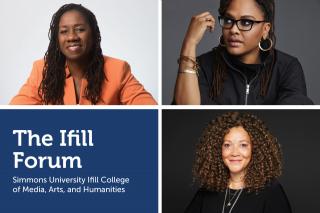The Gwen Ifill College of Media, Arts, and Humanities hosted the second annual Ifill Forum on Saturday, November 14. A model of intellectual curiosity and truth-seeking, Gwen Ifill '77, '93HD inspired this annual event aimed at bringing together national voices for an eye-opening and dynamic discussion on the important issues of our time.
“When Simmons named a college after her, we accepted the honor and responsibility to become a part of her legacy for the next generation and for the community who lifted her up,” said Dean Brian Norman as he kicked off the event. “That mission drives all that we do. With the Ifill Forum, we pay tribute through conversations that matter.”
With over 1,500 registrants for the event, the 2020 Ifill Forum focused on “Facing Hard Truths,” a timely topic amid a deeply divided country, a presidential election with profound impacts on our democracy, ongoing racial reckoning, misinformation, voter suppression, the pandemic, and unreconciled history.
Yamiche Alcindor, White House Correspondent for PBS NewsHour presented the 2020 Gwen Ifill Next Generation Award to Ava DuVernay, filmmaker and founder of ARRAY. The award recognizes a professional who exhibits the promise to carry on the work of fostering civic dialogue and an informed, diverse citizenry.
“[Gwen] was a brave and courageous soul who never backed away from facing the hard truths and educating the world about them,” said Yamiche Alcindor, who received the award in 2019. Alcindor noted that she sees Ifill’s dedication to justice, education, and truth in DuVernay.
Gwen is someone who held our hand,
squared our shoulders, and helped us
confront hard truths."
- Michele Norris
“This world is infinitely more informed because you have walked in your purpose with grace and confidence,” said Alcindor on DuVernay’s work. “Your films and series have shaped a generation of Americans, especially Black Americans, to embrace and respect the distinct experience of Black people in this country.”
Upon receiving the award, DuVernay shared many memories of Gwen Ifill and detailed the profound impact of Ifill’s mentorship on her personal and professional journeys. DuVernay recalled juxtaposing characteristics of Ifill, noting that her “integrity and intelligence loomed large,” but that Ifill was also a “soft place to land” during turbulent times in her career.
“She built me up, she rewarded me — maybe when I didn’t even deserve it,” recalled DuVernay. “She made me feel like one of the girls, and if you’re a Black woman, you know there are few things more special than that.”
Washington Post columnist, Michele Norris, moderated the panel discussion between DuVernay and Sherrilyn Ifill, president and director-counsel of the NAACP Legal Defense and Educational Fund, Inc.
Norris began the conversation by echoing DuVernay’s sentiments of Ifill’s friendship and Alcindor’s description of Ifill’s dedication: “Gwen is someone who held our hand, squared our shoulders, and helped us confront hard truths.” These hard truths ranged from the election and fragility of American democracy to voter suppression and the myth of a successful racial reckoning.
Norris went on to illustrate how each woman participating in the forum was a storyteller in their own ways: Alcindor’s journalism, DuVernay’s series and films, and Sherrilyn Ifill’s narrative in the courtroom. She asked both DuVernay and Sherrilyn Ifill how they were telling the story of COVID-19 and the racial reckoning of 2020.
DuVernay began by discussing her many upcoming projects and how she hoped they would serve as a time capsule of this year. She also explained that through all of her storytelling, she hopes that “more people will start to care” about the lived experiences of Black Americans and inspire them to take action.
Similarly, Sherrilyn Ifill is telling the story of the pandemic and voter suppression through her legal action. She specifically referred to ongoing litigation attempting to protect incarcerated populations from COVID-19, and the massive human rights violations in prisons, calling it “the shame of our nation.”
“You don’t stop truth-telling,” she advised. “We can’t ever stop the truth-telling even as we work to confront, overcome, and deal with the deep, deep racism that is burrowed into the foundation of this country.”
As Michele Norris concluded the discussion, she reminded attendees of Gwen Ifill’s journalistic talent in telling these hard truths. “We have seen so many bright, shining examples of Gwen’s legacy. I believe that she still shines bright like a beacon, like a lighthouse that guides us through these difficult moments.”

